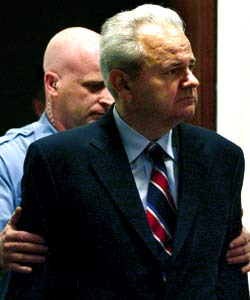While the sovereign equality of all states is a principle that today’s countries praise and claim to respect, there is growing evidence that for a certain class of countries, sovereignty has its limits.
In March 2011 the UN Security Council authorized member states to use force to protect Libya’s civilians from a brutal crackdown by Colonel Muammar Qaddafi. NATO forces have essentially taken the side of the rebels in Libya’s civil war and some leaders, including President Obama, have called for Qaddafi to step down. In a similar case a decade earlier, NATO forces bombed Belgrade, eventually forced Serbian leader Slobodan Milosevic from power, and paved the way for an independent Kosovo after Milosevic had unleashed a campaign of ethnic cleansing against Albanians in Kosovo—a province of Serbia and thus ostensibly an “internal matter.” This week’s arrest of war criminal Ratko Mladic in Serbia and his extradition to the war crimes tribunal in the Hague is only the latest example of political and military officials being held accountable to supranational authorities including the International Criminal Court. The ICC, under its ambitious Chief Prosecutor Luis Moreno-Ocampo, has gone so far as to issue arrest warrants for sitting heads of state including Sudan’s Omar Al-Bashir and Libya’s Muammar Qaddafi.
In short, international norms seem to be evolving away from unconditional sovereignty and toward a “responsibility to protect” doctrine that says if governments fail to protect their own people from grave human rights abuses the international community has the right to intervene to do so. But is this high-minded doctrine applied selectively to target only those countries who lack the political clout, economic pull, or military muscle to defend their own sovereignty? Do China and Russia get away with human rights abuses because of their great power status and UN Security Council veto privileges? Does Saudi Arabia get off the hook because of its oil wealth and powerful benefactors? Does America’s superpower status render its political and military elites immune from ICC action despite allegations that the U.S.is responsible for war crimes in Iraq and Afghanistan? If the answer to each of these questions is “yes,” is there anything that can be done about it, or was the historian and early realist Thucydides correct when he famously said that “the strong do what they can, and the weak suffer what they must”?


You must be logged in to post a comment.